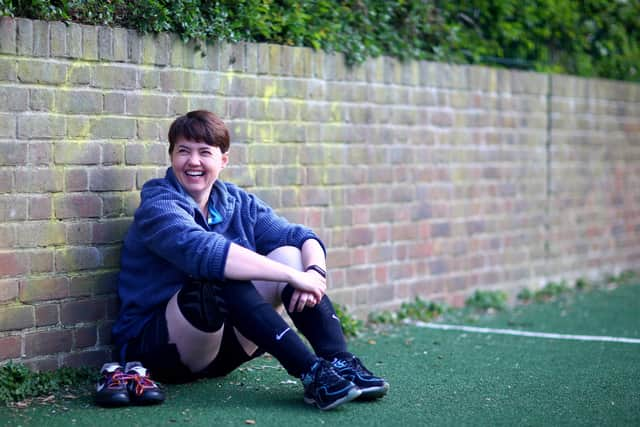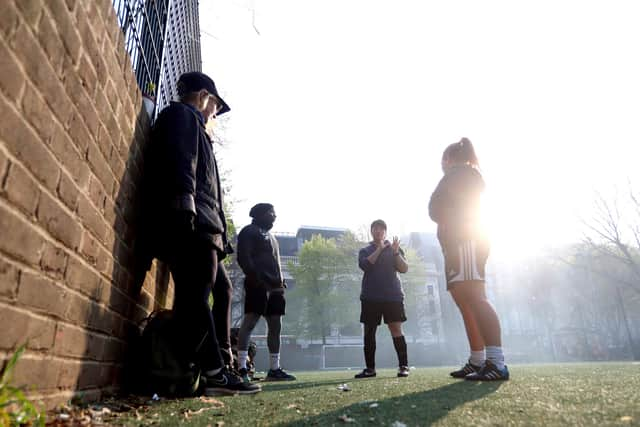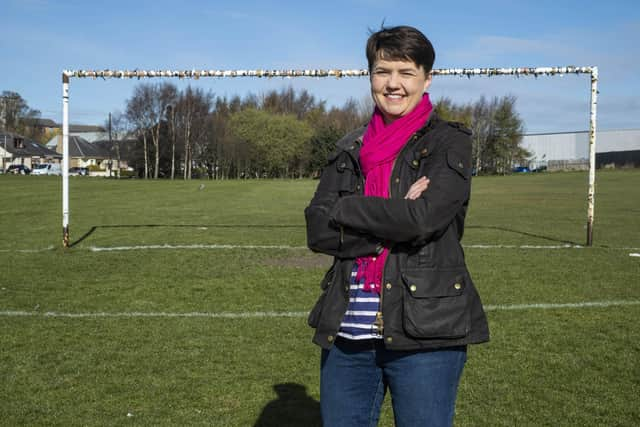What brought Ruth Davidson to tears and why she wants broadcasters to put a cap on gambling for Euros
"It happens,” she says somewhat apologetically.
"To be honest I think since I’ve had Finn the hormones have never kicked back in properly, so yes, if you’ve got a donkey sanctuary on the telly then I'll be in floods.
"I never used to. I was never hard bitten, but I was always able to stay on top of things. But it's all changed.”


Advertisement
Hide AdAdvertisement
Hide AdShe’s not crying for donkeys though, nor indeed for her young son.
Rather, the tears come when she looks at a photograph of her much younger self decked out in the light blue colours of Largo boys under-14s, the first football team she played for – an astounding achievement given at the age of five she was hit by a truck and could possibly have lost the ability to walk, never mind kick a ball again.
She’s spoken about the physical pain of that before, and does not dwell on it.
Indeed the tears are a fleeting moment in an incredibly emotional documentary on the relationship between football and gambling the former Scottish Conservative leader has filmed for Channel 4 and which will be broadcast tonight.


Ms Davidson, who is yet to take up her seat in the House of Lords after quitting Holyrood and life as an MSP, has filmed the documentary, she says, to allow the voices of those who might not otherwise be heard to be amplified as the UK Government prepares its White Paper on gambling reform.
She is keen to ensure that when any new legislation comes forward, that impact of gambling addiction is fully understood by politicians.
"We're not trying to bash what happened last time," she says.
“Nobody foresaw the change in technology, but it's landing on this government to do something about it because we're at the stage of something needs done. And if I exert pressure on my own team, then then so be it.


Advertisement
Hide AdAdvertisement
Hide Ad“I don't think legislation is the only solution here, but this [gambling addiction] has almost been like a boiling a frog since the last legislation change. Online gambling has increased every year and it is at saturation point.
"Arguing for moderation is never a sexy argument, particularly not for a politician, but I think there is an element needed of walking things back a bit to perhaps where we are closer to where we used to be.”
Where we used to be was before the 2005 Gambling Act ushered in by former prime minister Tony Blair, passed in order to help move the UK from an "unregulated and potentially dangerous market” into one that prioritised safety and openness and, importantly, in which players were protected from gambling harm.
At least that was the theory, and as Ms Davidson says, was long before anyone had any idea of how online gambling would take off, particularly around football – a sport that has also seen millions pumped into its coffers from sponsorship by betting firms.
Where once strips boasted the names of alcoholic beverages, they now have online gambling businesses.
“What's really clear to me making the film is that the football teams or clubs don't necessarily want to have gambling at their heart,” she says. “You know, they want to do right by their fans, but they feel that they can't afford to step off the treadmill.
"The gambling companies themselves have made some steps on things like a whistle-to-whistle ban. They realise there's a reputational threat around addiction, but they are still in a competitive market and will try and find a new product and keep their customers.
"So there has to be somebody that sits above them, because self-regulation on its own won't work. And that's actually where the government does come in.
Advertisement
Hide AdAdvertisement
Hide Ad"So I think there is a job for government to tackle this. I’m not in favour of prohibition – in fact no-one in the film is. I've had betting accounts before, you know.
"I've bet on the Grand National every year, I buy scratch cards, so I’m not Mary Whitehouse on this. But the damage that I have seen is undeniable and I hope it comes across in the film.”
The damage is human. In the documentary Ms Davidson meets Judith Bruney, a Sheffield mum who tells of her son’s Chris descent into gambling addiction after first placing a bet when he was 22 at the 2014 World Cup.
She, and Chris’s girlfriend Fran, are so obviously broken by his suicide at the age of 25 that at times they cannot find the words to express their emotion.
"He was quite mischievous, very lively … intelligent, he was a joy to be around,” says Ms Bruney.
“He just said to me I’ve done something stupid … I’ve lost £10,000. I said you’ll easily earn that going to work and doing what you're doing, but I didn’t know what the gambling companies do. After that, they didn’t leave him alone.
“It wasn’t the fact that he went downhill because he was in debt... it was what they did to his soul. It wasn’t him and he couldn’t escape what they were doing.”
Despite trying to stop gambling, in 2017 Chris lost £120,000 of savings in five days.
Advertisement
Hide AdAdvertisement
Hide Ad“The Thursday morning, his dad got up for work at half five and saw Chris’s bedroom door was open and he went in and saw a letter … he came in to me and said Chris was gone,” she says. “I looked at the letter and we rang the police, and I rang Fran. Deep in my heart I knew.
“We just live each day the best we can now. It’s not happy, it’s not a happy life. It used to be.”
Fran explains how Chris had left her the password to his computer.
“He got emails, just constant about gambling,” she says. “I responded saying ‘please can you stop’ and they proceeded to continue. He was hounded.”
She continues: “The area of dispute is when we're talking about the numbers. So you've got some official figures that say there are 200,000 problem gamblers in the UK and you've got others that say that it's 1.2 million. And then there's one suicide every day put down to gambling.
“For somebody who's from the centre right and who believes in personal liberty and responsibility there is a slight reaction to the idea that the government, big government has to do something.
"But we do look at health protection in this country, we do look at keeping people safe. And I think that there is an argument here that there is a public health responsibility.
"We’ve learned a lot over the last 15 years and the stuff going on in the gambling clinics shows that therapy works. It shows that there are tools that can help people break the addiction. So this isn't a hopeless film. It's not supposed to be a hopeless film.
Advertisement
Hide AdAdvertisement
Hide Ad"There are solutions that are available and one of the issues that was raised is that both women and ethnic minorities are very underrepresented as people who present at these gambling clinics.
"And I know that psychologists and others want to be able to reach these communities better. So it'd be great to be able to see more promotion of their work and how people can access them.”
The 15 clinics are currently all based in England, although in Scotland addicts are dealt with through different channels.
Ms Davidson is at pains to point out the documentary is about a UK-wide problem. Gambling, she says, particularly online, respects no borders.
“One of the most powerful statements I heard was from psychologist Matt Gaskell who said ‘we're fishing people over a river that the industry is throwing in’,” she says.
"And they're not getting everybody that flows past. So let's let's move up river a bit. Let's look at how we can stop people getting thrown in the river in the first place.”
Ms Davidson says there is no real argument that football needs gambling money.
“The argument that if you take gambling money out of football, nobody will fill that void was exactly the argument that was made about shirt sponsorship for alcohol companies,” she says. “But somebody did come in and fill that gap.
Advertisement
Hide AdAdvertisement
Hide Ad"That's the point that Mark Palios, the head of Tranmere Rovers, and the former head of the FA makes in the documentary – yes, your commercial teams will have to work harder, but there are still people that want to sponsor and be associated with a football team and a football club for exactly the same reasons that gambling companies do – because of the fan loyalty, because it's part of your community, because it has all of these values associated with it.
"People's relationship with a football club is often the longest relationship they'll have in their life. It’s a life-long love affair and it means something. And sometimes it's hard to articulate what football means to people who are football fans. But it matters.”
It matters to her.
Ms Davidson is the youngest of two daughters and puts her love of football down to her father who played professionally for Partick Thistle and Portadown in Northern Ireland.
“He played at a really high amateur level for quite a long time and he managed,” she says.
"He played for both Selkirk and Gala and he won the Scottish Qualifying Cup. So the guy that ran the local boys football team that I played for, Billy Syvret, was one of his pals. And he'd been a professional player for Tranmere and my dad would come and help Billy with it sometimes.
"My dad has always loved football and he loves the spirit of the game, you know. He always believes in sportsmanship, not gamesmanship. I was always kind of taught you will never be a good winner if you can't be a gracious loser.
"It was a big thing in my life and you can see from the end [of the documentary] I'm not saying I'm any good at football. It’s just really been a big part of my life.
"I want it to be part of Finn’s life too, but I worry about taking him when gambling is so embedded in the game.
Advertisement
Hide AdAdvertisement
Hide Ad"I do think that there is a moral responsibility and a value system in sport about team work, about excellence, about professionalism, about sportsmanship, and gambling shouldn’t be attached to that. I do worry that for younger generations the football experience cannot be experienced without gambling. I think we have lost something.”
Is she concerned about a spike in gambling during the upcoming Euros?
“I think what's really interesting is the family that we spoke to, so Fran, and Judith, who lost Chris, he went from a guy that hadn't really been gambling, but got into it around a big tournament,” Ms Davidson says.
"I think we have to be alive to the fact that these really big international tournaments can be a risk element for people because there's a social element to watching them, and if you’re with mates and everybody else is gambling and can suddenly afford the next round because they've won 100 quid, then you can absolutely see how somebody who perhaps hadn't been that interested in it before it gets interested.
“And from viewing figures we know that people who aren't regular football fans watch because there's a sense of occasion. So yeah, I think there is a risk element coming up with with the Euros.
“I think that we do just have to be a bit wise to that.
"It's too late for anything legislative, you can't do that, but in terms of the broadcasters themselves, are they willing to be responsible?
"You know, there are a number of big broadcasters that have tie-ups with mental health charities that do a lot of good work in the sector that understand the platform that they are … so the whistle-to-whistle ban, for example, is non legislative.
“Personally, I don't think it goes far enough. And when you start scheduling the games for 8:15pm, so that, you know, you've got your halftime at 9pm, because you've got a 9pm ban on some stuff as well. I mean, I think people are playing the system a little bit. That's why there has to be an element of law in this.
Advertisement
Hide AdAdvertisement
Hide Ad"We’ve sleepwalked into this. But it demands attention because it is affecting, and ruining, people's lives. And it's really disproportionately in the communities where people have the least.
"You can draw an absolute line from somebody in Salford or the Wirral or Clydebank from the fiver in their pocket to [Bet365 boss] Denise Coates’ £400 million pound paycheck at the end of the year, via some very highly paid footballers. It's like a parasite and football is the host.”
Ms Davidson stresses that she has produced the documentary to push the issue up the political agenda and to balance the pressure she believes government ministers will be under from the industry, football clubs and the Treasury.
“They’ll be saying we're all making money out of this,” she says.
"Let's not upset the apple cart and to a degree, I understand why. Football, finances are not great and that needs a whole other review separate to this. But ministers need pressure from the other side of the argument too. And they need to be able to see those people that don't have a voice.
“Those who are not going to be invited into the DCMS for a roundtable with ministers. So let them tell their story. Let ministers look them in the eye and understand and let people see action is required because there is harm happening.”
Football’s Gambling Addiction is on tonight , 7:30pm on Channel 4 and available on All4.
Comments
Want to join the conversation? Please or to comment on this article.